The Startup CEO Job is Intense, Lonely, Rewarding & Crazy
Survey says: Being a CEO is tough, but they love it anyway. (#15)
Startup CEOs come in all shapes and sizes, but one thing is clear: the experience is no joke.
I conducted a survey of 69 CEOs and learned a lot. My goal was to dig into the CEO experience—what they like and don’t like about the job, what they’ve learned, and more. Here are their stories.
The demographics
The survey had a good mix of new & experienced CEOs. The highest % of respondents had 3-5 years experience. Most are in North America.
The startups they run (or ran in the past) also varied quite a bit in stage and size. Most said they were Seed / Seed+.
Most have either 0-10 employees or 11-50 employees. But we did have a decent number of bigger companies represented.
Are CEOs supremely confident?
I asked two questions about confidence:
Before becoming a CEO, how confident were you in your abilities to do the job?
Now that you are a CEO (or reflecting back on your time as a CEO), how confident are you in your abilities to do the job?
There may be a bit of recency bias, but most CEOs were quite confident (on a scale of 0-10) before taking on the role, and grew in confidence from there.
This chart shows an aggregate view of respondents’ scores.
One brave CEO (who asked to remain anonymous, but was still clearly honest in his answer) scored himself a 0. I’m happy to report that he now scores himself a 6!
The average before score was 7.33
The average after score was 7.94
So most CEOs were already quite confident—although you can see a few in the 3-5 range—and most CEOs became more confident with experience.
In fact, 72% of the CEOs surveyed said they were more confident after becoming CEOs. That’s a healthy number, although that means 28% became less confident.
One CEO wrote in the survey, “It is harder than you can imagine. The pressure is huge.” She’s not wrong—and that was a fairly common sentiment from many of the CEOs, even if they felt more confident now than before.
I don’t want to suggest we hold a pity party for founders/CEOs. They all 100% chose the job. But I do think it’s important to recognize the toll it takes. If you are struggling as a founder/CEO, please talk to someone.
What do CEOs enjoy the most and least about their jobs?
The #1 thing CEOs enjoy is making an impact. They think of this across the company, the people they work with and the world. They enjoy solving complex problems and having the autonomy & freedom to make decisions.
Interestingly, one of the things many CEOs enjoy — building and leading teams — has a strong counterpoint amongst the least enjoyable parts of their job, which is people management. A number of CEOs expressed frustration with employee issues, including firing low performers, managing conflicts and the stress of supporting employees.
Allen Lau, ex-CEO/founder of Wattpad, which sold to Naver for $600M, had a lot of great things to share, demonstrating the ups and downs of being a CEO.
Here’s a quote from his response on what he enjoyed most about being a CEO:
“Set the bold vision and unconventional strategy, created a category leader, pioneered in new areas, coached new leaders, raised (the right amount of) capital at the right time, successfully exited, etc. Ultimately, making lots of high-quality and important decisions is incredibly fulfilling.”
And here’s a quote from his response on what he enjoyed least:
“The stress of all the high stake decisions, the accountability of EVERYTHING, the lack of control of my own time, all the admin stuff, all the people issues...”
When the decisions work out, you feel great; but making the decisions can be incredibly stressful and difficult!
Coaching leaders who scale with the company and help drive its success is amazing…but that doesn’t mean you won’t face a slew of people issues.
I think Marc-Antoine Ducas, CEO at Netlift summed things up nicely with his answer about what he enjoys the most:
“Create value, build things, change the world for the better, spend my days dealing with new problems and insanely smart people”
Interestingly, the #1 thing that CEOs dislike is fundraising.
This isn’t surprising: fundraising is a tough grind. Most founders go through the gauntlet and get rejected constantly. You need crazy thick skin to spend months being told you’re not good enough and your company won’t succeed, while working to be good enough and build a successful company.
Sidebar: 5 Quick Truths about Startup Fundraising
Ignore the hype. It’s so easy to get caught in the hype machine of monster financing rounds, big name VCs on Twitter, the media, etc. You can drown in the hype, and it’ll make you feel significantly worse when you’re struggling to raise (which is the case for most founders.)
Raising capital is all-consuming. It’s not only the endless meetings with investors, but it’s also the mental energy & stress that are exhausting. You will find it very difficult to build your company and raise capital at the same time, which is brutally ironic, because many investors will likely tell you that you’re too early and you need to focus on building your company.
VCs are wrong most of the time. Please take the feedback and questions you get seriously, but also recognize that VCs are wrong more than they are right. If you hear the same question over and over, you have to address it. But take everything with a grain of salt as well.
Pitching matters. I’ve seen hundreds of pitches. My level of interest in a startup is 100% affected by the quality of the pitch. I can’t help it. And neither can most investors. So nail the pitch. Here’s something that may help you.
Your Plan B should probably be your Plan A. Most founders have an ideal amount of capital they want to raise (Plan A), and a less-than-ideal amount that they can still get by with (Plan B.) At this point, given the market, people’s nervousness, VCs clamping up, valuations dropping, etc. you should just make your Plan B your Plan A, and then have a different Plan B (which was previously Plan C.) You probably will need to raise less and stretch those dollars further.
Administrative tasks came in 2nd as the most disliked part of CEOs’ jobs.
A month ago, I wrote a LinkedIn post where I said, “I never want to be CEO again.” It got a lot of feedback (currently at 324 comments!) Many CEOs or ex-CEOs shared their stories, and that’s what inspired me to run the survey and dig into the topic further.
Why don’t I want to be CEO again? Because most CEOs spend a lot of time doing things they don’t really want to be doing, including administrative tasks. You think you’ll be spending a lot of your time on the “engaging/challenging/fun stuff” but you don’t. First-time CEOs may not fully appreciate this reality, and it can be a disheartening realization.
What is the #1 lesson CEOs have learned?
Here’s a thematic summary of responses:
Importance of people and talent management
Need for focus and prioritization
Emphasis on communication and building relationships
Learning to delegate and empower others
Maintaining resilience and perseverance through challenges
Managing finances and cash flow
Being adaptable and willing to learn and change with the company’s growth
Building a strong culture and values for the organization
Importance of decision-making and accountability
Understanding the role’s demands and managing personal well-being
The most common theme was focused on people.
Luca Cuccia, CEO at Injoy said:
“Put more trust in your team and delegate. This will lead to a greater feeling of accountability and motivation. Just because someone does something differently than you would have done does not mean it is worse.”
Kyle Racki, CEO at Proposify said:
“Most of us put off hard conversations for too long. See if you can cut the length of time it takes to have hard conversations in half every time. If it took you a year to tell your department lead they weren’t measuring up, see if you can do it in six months next time.”
Michael Parrella, former CEO of POWWR said:
“Hold people accountable to what they say they will do.”
One CEO (who asked to remain anonymous) said:
“Between great hires and bad hires, good hires are the worst because you can’t easily decide to let them go (they’re good) but you need to because they’re not great.”
I want to share two other quotes that do an excellent job of summing up the realities of being a CEO/founder of a startup (frankly, at any size):
“The CEO job changes rapidly as the company scales but no one would tell you your job description has changed. You have to keep learning and keep raising the bar in order to keep up. No one would even tell you if you are doing a good job or not. That's why it is the loneliest job on the planet. The job is 80% crappy and 20% glory but if you could deal with the crap, then the 20% glory would make it all worth it.” - Allen Lau (former CEO/founder at Wattpad)
“Being a CEO means living, breathing, sleeping, eating your company every minute of every day. So if you’re not ready for that, don’t do it.” - Marwah Younis, CEO at Agate Medcare
What do CEOs wish someone had told them before they started?
The most common theme was related to loneliness and isolation. Many of the respondents mentioned the heavy responsibility and pressure they feel, as well as the fact that few people in their organization or personal lives truly understand what they’re going through.
Again, I’m not here to shed tears for CEOs—they didn’t have to start companies.
But this is an important theme to address.
Here are some examples of answers:
“You are on a very long, lonely journey with very few people to lean on.”
“The weight is heavy.”
“Even if the role is rewarding for your ego, it's a heavy challenge to cope with the pressure that comes with it.”
Anita Ramdas, CEO of Shufflespace, provides a great summary:
“That it was going to be super lonely and that I should build a community of support around myself, other entrepreneurs at a similar stage, great advisors and not just business support but emotional support as well from people that get what your going through.”
Founders need mentors & coaches
The topic of advisors & mentors came up quite often and it’s worth exploring further.
Founders/CEOs need mentors & coaches. (Note: Everyone can benefit from a mentor or coach, not just founders or CEOs.)
Specifically, they need people who are focused on them, and not their businesses. There are some mentors or advisors that are there to primarily help with the business (i.e. domain experts, connectors, etc.) but what founders/CEOs often forget is to get help for themselves.
There are two good sources of personal mentors & coaches:
Peer Groups: Often CEOs will get together in groups to share. These are meant to be safe spaces for peers to communicate openly about the challenges they’re facing. Peer groups are good for both business/tactical help and emotional support.
Experienced Founders: Those that have “been there, done that” can be great mentors and coaches. They’re there for you; not necessarily for the business. Sure, they can help with tactics, etc. but their #1 job is to help you navigate the challenges of being a founder/CEO.
I’ve played the role of mentor/coach a few times. My job is to listen, let them know that what they’re going through is OK, and guide them through whatever difficult decision making process they’re dealing with.
To be clear, I am not a psychologist or therapist. You don’t have to be. But past founders/CEOs should be able to relate to what current founders/CEOs are going through. If you can be there for someone, you should. It’s a rewarding experience, and important to give back. You’ll learn more than you share. And remember: it’s not about the business. It’s about the person or people running the business. That’s your #1 priority in this context.
What are CEOs focused on getting better at?
Here are some of the common themes:
Time management and prioritization
Delegation and team building
Communication and storytelling
Fundraising and sales
Strategy and planning
Personal and professional growth
One person (who asked to remain anonymous) said:
“I’m learning how to say no and be more strategic around how I spend my time and enabling those around me to take more on.”
Leif Baradoy, CEO at Giftbit, said:
“Leading leaders. Learning to lead is something you have to earn then learn to do.”
Liza Akhvledziani, CEO at Chexy said:
“Managing a much bigger than what we used to be team and setting up that company culture where people feel rewarded for their hard work.”
Delegating is f-ing hard
Delegating is a recurring challenge for CEOs. I struggle with this a lot. I often think, “I can do this better and faster, so I should just do it.” Talk about being an egomaniac. Sigh. And this is a road to nowhere, because you can’t scale yourself (I don’t care how much generative AI automates for you), and eventually you need trusted employees to scale & win.
Own the vision, but give space for others to make it their own and be the innovators. Don't help too much. Many CEOs (myself included) kill team growth, productivity and innovation by over-contributing ideas, energy and solutions. If you want people to act like owners, you need to let them be owners. - Wayne McIntyre, CEO at Relocalize
Since I’m terrible at delegating, I asked others—actual experts—for help.
Ryan Vaughn, Founder & Executive Coach, Inside-Out Leadership shared his thoughts:
Are you "bad at" delegating or are you "uncomfortable with" delegating?
Very few people are bad at delegating. If you delegate and you get bad results back, you either are not communicating well, or you’re delegating to the wrong person. In either case, those are easy fixes.
Many people who say they're bad at delegating are actually uncomfortable with it. They hold on too tightly, and their Superman abilities hold back the growth of their company. This is more involved to change.
Learn what it feels like to be uncomfortable with delegating
When we feel discomfort with life, generally what we're feeling is the activation of an automatic safety pattern in us that we learned early on. Delegation is no different. The first step toward changing an automatic safety pattern is becoming intimate with it. To do this, use a simple self-observation framework like the one below.
Framework
When you try to delegate (both when deciding what to delegate, and when actually doing it), notice:
What emotions come up?
What body sensations come up?
What story do you tell yourself?
How do you find yourself reacting to these sensations (leaning in, leaning out, distracting yourself)?
What does this remind you of in your life? Now, or when you were young?
Track this for a few weeks. Try to pick up all the nuance of what your experience is like. Be curious. Then look for patterns of what the experience of "being uncomfortable at delegation" really is like for you. Become so intimate with your safety pattern that you notice it every time it comes up. The process of developing this awareness will shift the way you relate to it and lessen its force (making delegation easier).
Practice
We all know intellectually that we can walk on glass-bottomed floors in skyscrapers. We see people doing it. But it doesn't feel safe, because it often takes our nervous system a bit to catch up to what our intellect already knows.
Knowing that it's safe to delegate happens first. But just like you have to take a couple baby-steps onto the glass to convince your body that you're not going to die, convincing your nervous system it's safe to delegate takes practice.
For a deeper dive, check out my essay on the nuts-and-bolts process of changing unconscious mental patterns.
Diraj Perkash Goel, Founding Partner at GetFresh Ventures shared a LinkedIn post where he articulates a framework, L.E.A.D, for delegating:
LIST: Everything you do (and break them into high-value and low-value categories)
ELIMINATE: Things in the low-value list that aren’t worth doing
AUTOMATE: Now reduce manual work
DELEGATE: Can’t do the former two? Then you need to delegate
Paul Marshall, serial entrepreneur & ex-COO of Wave (acquired by H&R Block), shared:
Accept that delegating is one of the requirements for you (and your team) to scale and grow...that’s WHY it is critical.
Hold team members (who you are delegating to) accountable for the outcome, not the 'how.' Allow them to have different/better/worse ideas than you and see them through. Support them when/if their ‘how’ fails and stay focused on accountability for the outcome.
Become a great questioner. Ask why they think certain things, or why they want to do certain things. Ask them to show their work. Ask them what approach they considered but did not take and why, etc.Over time this process creates space for you to elevate, it elevates them and you get to teach and learn and get comfort with their thinking and process
Hug a CEO, they deserve it
Make sure you have consent.
This isn’t about hero worshipping founders that charge forth into the abyss, leading their brave troops to battle. This isn’t about glorifying hustle culture. It’s about recognizing the intense ups and downs of being a CEO/founder and learning from others.
Startups aren’t a zero sum game. I can win, and so can you (unless we’re directly competing, in which case, I’m sorry, you’re dead to me.) And I’m convinced that the best founders and CEOs are yet to come—they’re out there somewhere, hacking away, researching, building up the courage to jump off the proverbial cliff and start a company. Win or lose, we should encourage more people to become CEOs & founders, we need ‘em.



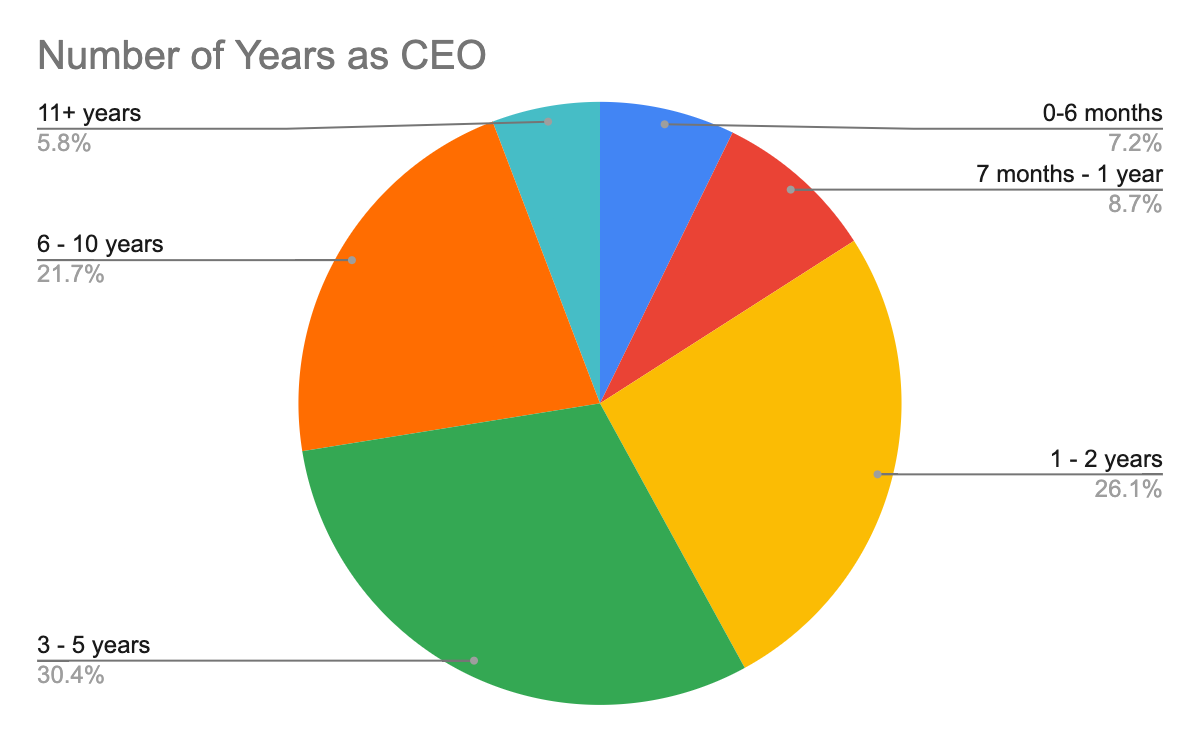
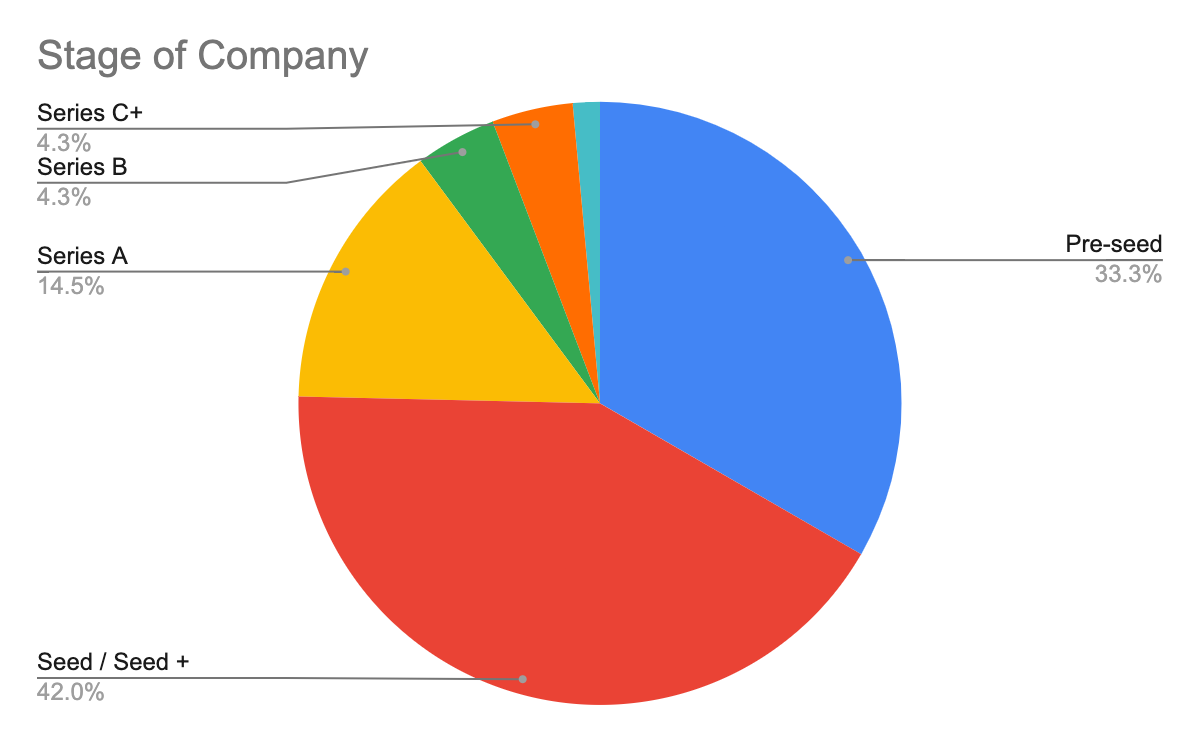
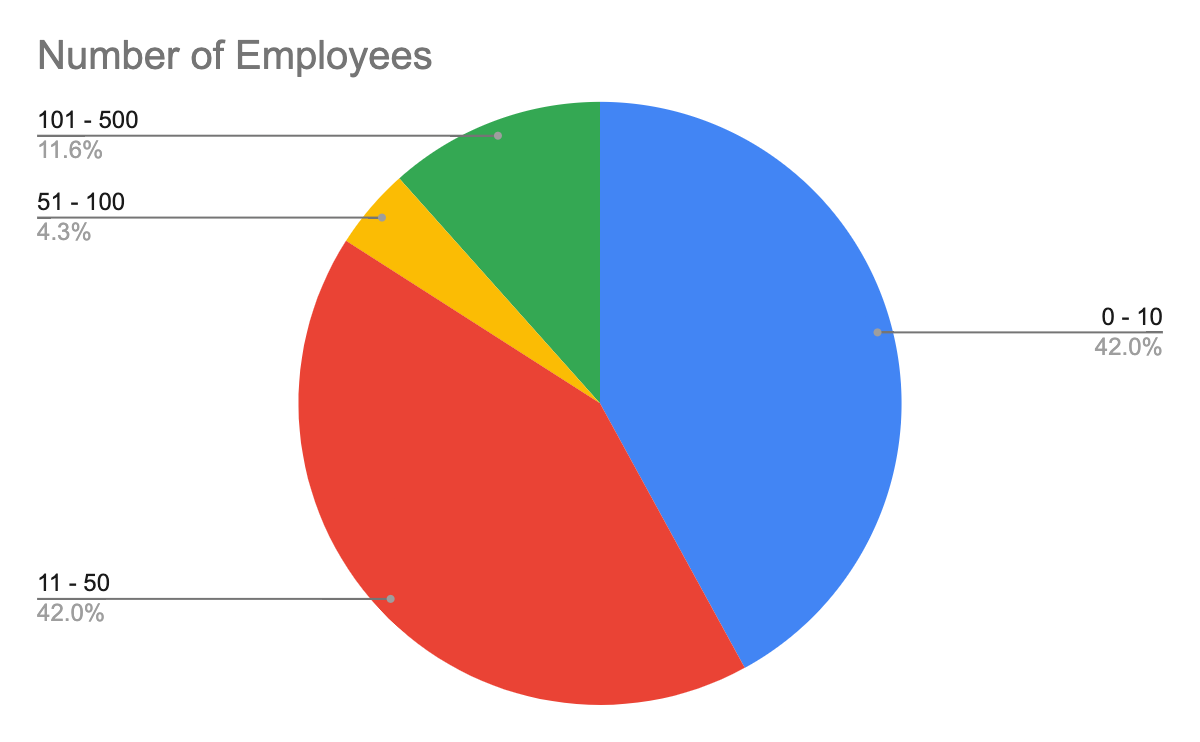
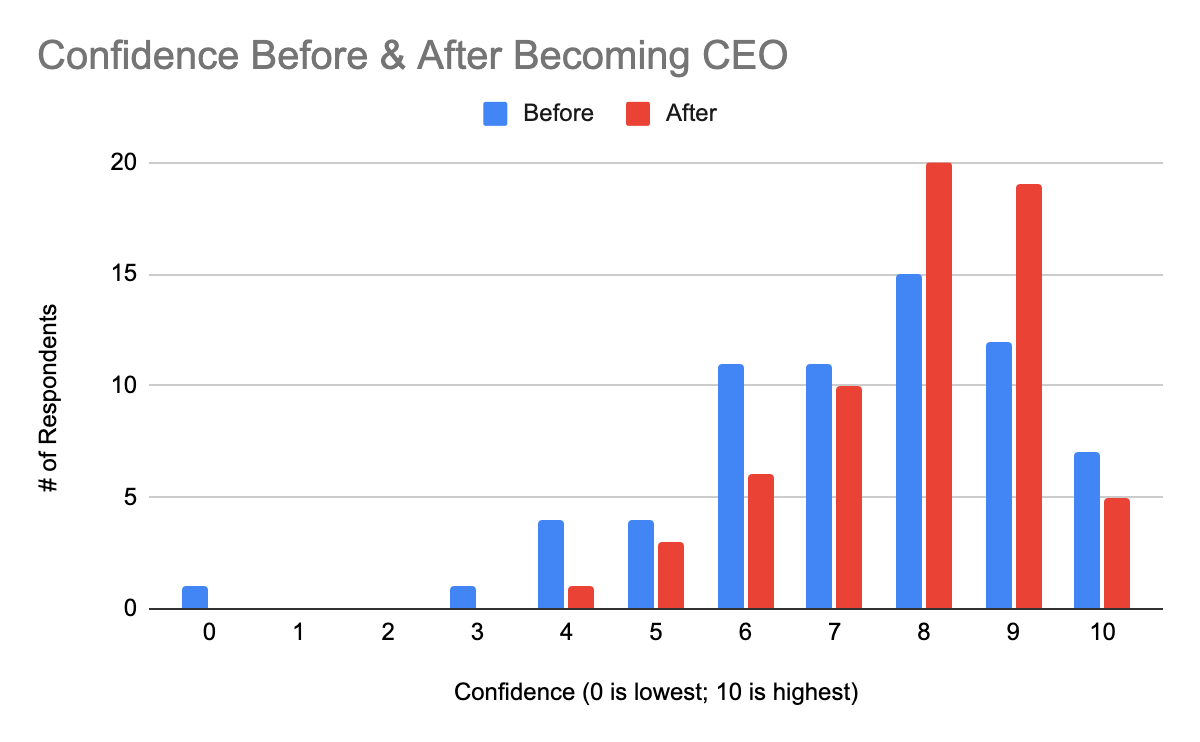

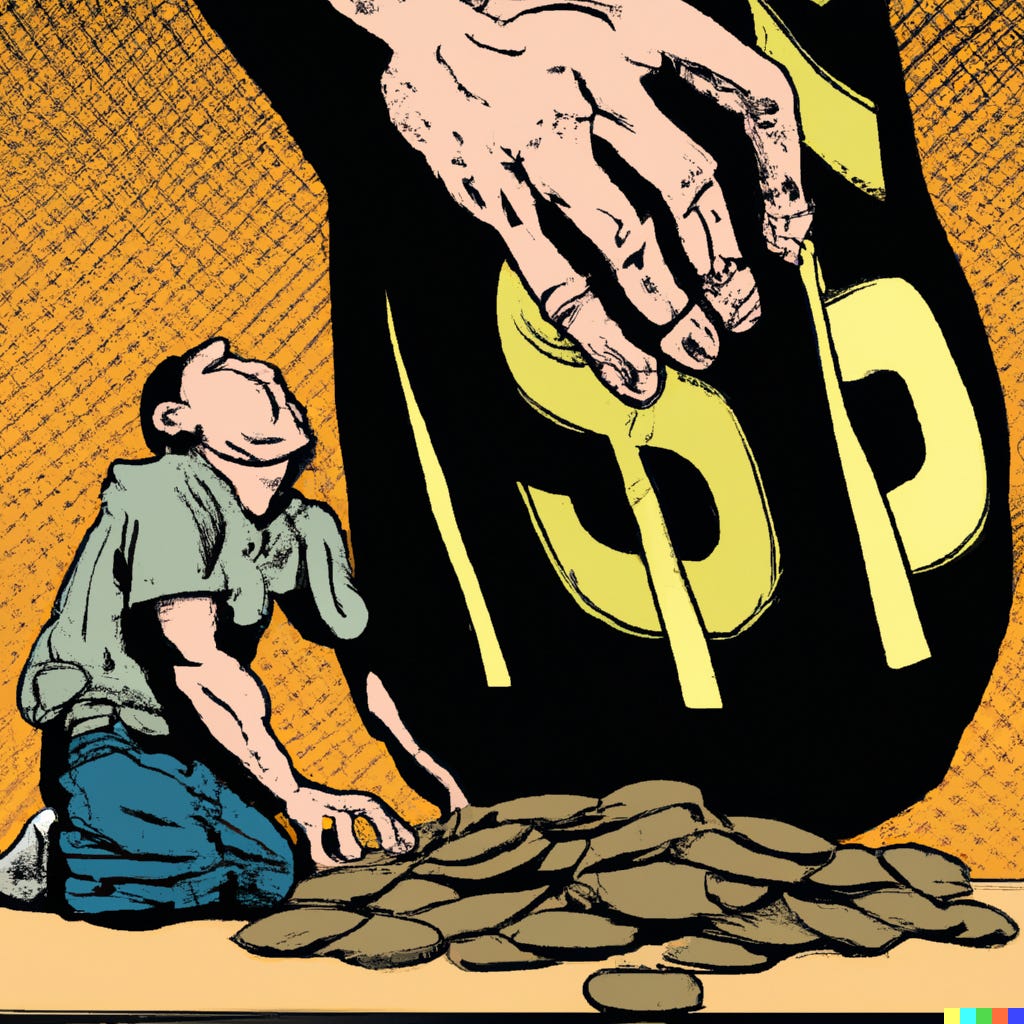



Wow! Thank you for putting in the time and work to pull this together.
A great pulse on CEO sentiment for the moment.
We've all been battered with black swan after black swan, so it's refreshing to see and feel what other CEO's are experiencing.
Agree... great article. Love it! Now that you have this good data, what's next?